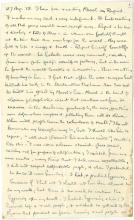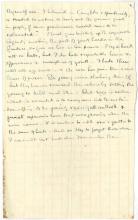BRACERS Record Detail for 18689
To access the original letter, email the Russell Archives.
"I have been reading Marsh on Rupert."
There is a transcription of this letter, document .007052-f6, pp. 586-7, record 93485.
Letter 85
BR TO OTTOLINE MORRELL, 27 AUG. 1918
BRACERS 18689. ALS. Texas. Auto. 2: 90–1
Previous Brixton letter, BRACERS 79641; next letter, BRACERS 19352
Edited by K. Blackwell, A. Bone, N. Griffin and S. Turcon
<Brixton Prison>1
27 Aug. ’18.
I have been reading Marsh on Rupert.2 It makes me very sad and very indignant. It hurts reading of all that young world now swept away — Rupert and his brother3 and Keeling4 and lots of others — in whom one foolishly thought at the time that there was hope for the world — they were full of life and energy and truth. Rupert himself loved life and the world — his hatreds were very concrete, resulting from some quite specific vanity or jealousy, but in the main he found the world lovable and interesting. There was nothing of humbug in him. I feel that after the war-mongers had killed his body in the Dardanelles they have done their best to kill his spirit by Marsh’s lies.5 Marsh is the kind of obscene photophobic insect that ventures out from its crevice in the darkness produced by the war, crawling over defenceless corpses and polluting them with its slime. When will people learn the robustness of truth? I do not know who my biographer may be, but I should like him to report, “with what flourish his nature will”,6 something like this: “I was not a solemn stained-glass saint, existing only for purposes of edification; I existed from my own centre, many things that I did were regrettable, I did not respect respectable people, and when I pretended to do so it was humbug. I lied, and practised hypocrisy, because if I had not I should not have been allowed to do my work; but there is no need to continue the hypocrisy after my death. I hated hypocrisy and lies: I loved life and real people, and wished to get rid of the shams that prevent us from loving real people as they really are. I believed in laughter and spontaneity, and trusted to nature to bring out the genuine good in people, if once genuineness could come to be tolerated.” Marsh goes building up the respectable legend, making the path of youth harder in the future, so far as lies in his power. I try so hard not to hate, but I do hate respectable liars and oppressors and corrupters of youth — I hate them with all my soul — and the war has given them a new lease of power. The young were shaking them off but they have secured themselves by setting the young to kill each other. But rage is useless. What is wanted is to carry over into the new time something of the gaiety and civilized outlook and genial expansive love that was growing when the war came. It is useless to add one’s quota to the sum of hate. And so I try to forget those whom I cannot but hate when I remember them.
- 1
[document] The letter was edited from digital scans of the unsigned, twice-folded, handwritten, half-sheet original in the Morrell papers at the University of Texas at Austin. The letter was published in BR’s Autobiography, 2: 90–1.
- 2
Marsh on Rupert “Afterwards Sir Edward. He had been a close friend of mine when we were undergraduates, but became a civil servant, an admirer of Winston Churchill and then a high Tory.” (BR’s note at Auto. 2: 90n.) Edward Marsh (1872–1953) had edited The Collected Poems of Rupert Brooke; with a Memoir (London: Sidgwick & Jackson, 1918). Although the vitriol of BR’s commentary on the book suggests otherwise, his note on the letter indicates that he once prized the friendship of its editor, a fellow Apostle, senior civil servant, literary anthologist, and influential patron of the arts. A lasting breach between the two men opened up over the war, much of which was spent by Marsh acting as Winston Churchill’s private secretary.
- 3
Rupert and his brother In June 1915, less than two months after Rupert Brooke died of sepsis en route to the Gallipoli theatre, his younger brother, (William) Alfred (1891–1915), a lieutenant in the Post Office Rifles (i.e., the 8th Battalion, London Regiment) was killed in action on the Western Front near Loos.
- 4
Keeling As an undergraduate at Trinity College, Frederic Hillersdon (“Ben”) Keeling (1886–1916) founded and became president of the Cambridge University Fabian Society and was a mentor of sorts to other socialist students, including Rupert Brooke. Moving into political journalism, Keeling began writing for The New Statesman when the Fabian weekly started up in 1913. He enlisted in the army the following year but refused a commission and was still serving in the ranks when he was killed on the Somme in August 1916. Not only BR but also G.B. Shaw, H.G. Wells and the Webbs admired Keeling’s talents and mourned his loss (see Samuel Hynes, A War Imagined: the First World War and English Culture [London: Bodley Head, 1990], p. 108).
- 5
Marsh’s lies Marsh’s name and the following sentence in the letter were omitted when it was published in the Autobiography (2: 90).
- 6
“with what flourish his nature will”Hamlet V.ii.140–1.


